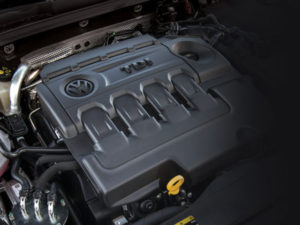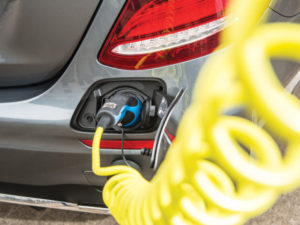Statement of Intent: How the Autumn Budget will impact on fleets
The Autumn Budget sent out a clear message on how the Government views diesel vehicles, which will impact future choice. But will the changes impact the way vehicles are sourced and funded? Curtis Hutchinson reports.

“From 6 April 2018 all company car drivers running diesels will see the long standing 3% supplement raised to 4%.”
The Autumn Budget may have been a mixed bag for businesses across the UK, but chancellor Philip Hammond sent a clear message to fleet managers and user-choosers; think twice before choosing diesel.
While the rights and wrongs of this approach can be argued at length, what is certain is this government’s stance on diesel; it will not allow itself to be seen to promote its use, and is now actively legislating against it.
From 6 April 2018 all company car drivers running diesels will see the long standing 3% supplement raised to 4%; a move that will penalise individuals for choosing diesel for its fuel efficiency and therefore make it less attractive amongst some user-choosers.
An even more overt message was the penalising of new generation Euro 6 engines – which have significantly reduced NOx emissions and low CO2 emissions. These units were rounded on for not complying with the Real Driving Emissions Step 2 standards; even though they do not become mandatory on new cars until 2021. By moving all diesels that do not comply (and that is currently all diesels) into a higher VED band from next April, the government has made a statement of intent; it might only equate to an extra £20 in the first year of registration but can be seen as an indicator of how diesel will be treated in the future.
Confused? You will be. Until then new fleet cars still need to be sourced. So how will the Budget impact these future choices and their funding? With this in mind Fleet World spoke to some of the key providers of contract hire and leasing services to UK fleets to see what impact they think the Budget changes will have.
A Continuing Role
Matt Dale, consultancy services manager at ALD Automotive, is unequivocal about the continued future role of diesel. “Diesel vehicles will continue to play a major role in contract hire and leasing fleets for the foreseeable future. Whilst they may have had some negative press in recent months and the chancellor has targeted them once again, the commercial benefits of running a modern diesel vehicle are still significant to many company car drivers and their fleets.
“Newer Euro 6 diesels are a far cry from previous generations in terms of pollutants and whilst their long-term future over the next 20 years is certainly in doubt, fleets still have another five or six replacement cycles to work out what’s best for their needs in the meantime.”
Furthermore, Dale believes any impact on residual values, caused by the slowdown in demand for used vehicles, will impact all diesels regardless of how they are funded.
“The cyclical nature of the used car market is something all experienced lessors are aware of and plan for accordingly. For most, therefore, a softening in resale values in recent months is not a surprise. Continuing growth and record new car volumes was unsustainable and, inevitably, this was always going to have a subsequent dampening effect on used car values three or four years later.
“Whatever funding method fleets choose, however, whether they buy outright or lease, falling RVs has the same affect regardless; an increase in total cost of ownership, for both petrol and diesel alike. The increase in cost is mirrored in both scenarios, whether from a fleet realising lower auction values for cars they’ve bought, or paying a higher monthly rental as a result of a lessor’s projected drop in a future resale value.”
So in the short to medium term the position of diesel looks secure, although Ian Hill, managing director of Activa Contracts, urges fleet managers to consider the alternatives when sourcing new vehicles.
“Diesel has dominated all fleets – irrespective of the vehicle funding route – for many years, but its position as the fuel of choice is under threat,” he said. “Fleet decision-makers must future-proof their vehicle operating decisions and that means analysing the pros and cons associated with petrol, hybrid, plug-in hybrid and zero- emission electric vehicles as well as diesel models.
“The likelihood is that, depending on business need, many fleets will find themselves contract hiring vehicles with a blend of fuel choices. However, diesel is likely to remain the preferred choice for high-mileage motorway driving and where a large number of journeys are made in non-urban environments.”
However, he suggests any fall in the residual values of diesel could give fuel efficient petrol cars more attractive contract hire rates. “Leasing companies will be taking a fresh view of diesel residual values and potentially reflecting increased depreciation in contract hire rates. As a result, petrol models in whole life cost modelling may prove to be cost-effective as may hybrid and plug-in vehicles in niche operations.”

Plug-in hybrids could offer a stepping stone to electric vehicles, if they are used correctly
Testing the alternatives
As petrol becomes a viable alternative, Hill warns against plug-in hybrid electric vehicles (PHEVs) being viewed as a panacea for all drivers. “PHEVs are only viable if they are used efficiently and, potentially, as a stepping stone to electric vehicles. However, all too frequently plug-in hybrids are chosen purely for their company car benefit-in-kind tax advantages and are never ‘plugged in’. As a result, fuel costs dramatically escalate – a case of wrong car for the wrong requirement.”
Richard Cox, a fleet consultant with Arval UK, also sees an ongoing role for it: “Diesel residual values are likely to weaken, and fleets may want to limit their exposure for this reason. Our best estimates are that there will be a decline in diesel representation on company car fleets of around 12% by 2020. Taking their place will be firstly petrol cars, then hybrids and, to a much lesser extent, full electric vehicles,” he says. The fact is that the underlying benefits of leasing remain convincing, almost irrespective of the kind of cars and vans that fleets want to acquire.”
So with petrol remaining the main alternative fuel to diesel, Nick Hardy, sales and marketing director of Ogilvie Fleet, also points out that cost of ownership calculations are reflecting it in a more positive light.
“Over the last three years there has been a very gradual swing away from diesel in the company car sector. However, that is not due to the demonisation of diesel, but a reflection of total cost of ownership figures, which should form the basis for all vehicle operating decisions. For example, petrol car performance, notably in terms of fuel economy, has improved and that is influencing total cost of ownership figures.”
Hardy also pointed out that hybrid and plug-in EVs have an increasingly important role enabling a greater choice in matching vehicle powertrain to individual driver requirements rather than the “historic defaulting to diesel”. However, he does not foresee diesel demand falling off a cliff and urges businesses to continue to choose cars by assessing their cost of ownership.
“Contract hire and lease rates are always kept under review and are reflective of marketplace conditions. Marketplace changes, such as the cost of money and used car vehicle demand, impact on all funding routes not just contract hire and leasing.
“The used car market has been overheating for a long time and what we are seeing is a realignment of values. It’s a gradual calming down, which makes no difference to the funding routes.”
When it comes to future vehicle choice and funding, the consensus is that diesel vehicles still have an important role to play in the medium to long term. However, fleet managers need to factor in how falling RVs will affect all funded cars and base all decisions on whole-life costs where they will start to see some petrol engine cars achieving more favourable rates.












